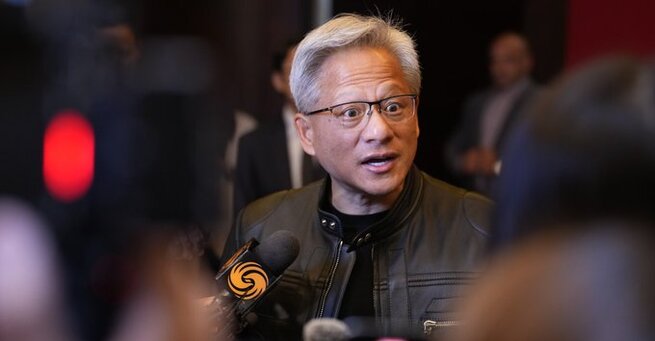
Trump Nvidia Breakup: How Jensen Huang Changed the Former President’s Mind
Donald Trump’s initial plan to break up Nvidia shocked many in the tech and political world. Nvidia, now the world’s most valuable tech company, caught Trump’s attention during his development of a new AI Action Plan. What started as a potential regulatory crackdown quickly turned into admiration for the company’s CEO, Jensen Huang. Trump, known for his tough stance on Big Tech, openly admitted he had no idea what Nvidia was until recently—but once he learned more, everything changed. This dramatic shift in opinion has left industry experts wondering: what did Huang say to make Trump back off?
Why Trump Targeted Nvidia for Breakup
Trump’s instinct to challenge Nvidia stemmed from concerns over market dominance and the company's role in the global AI chip market. During his speech in Washington, DC, Trump admitted he originally believed Nvidia should be broken up to increase competition. His motivation wasn’t unlike his past criticisms of tech monopolies such as Google and Amazon. Trump recalled asking, “What percentage of the market does he have?” only to be told, “Sir, he has 100%.” This revelation sparked curiosity rather than immediate action. Unlike previous instances where Trump aggressively pursued antitrust actions, his approach to Nvidia softened quickly.
Part of this reaction stems from how dominant Nvidia has become in the AI sector. With nearly all leading AI systems—from ChatGPT to self-driving car platforms—running on Nvidia’s chips, any disruption could significantly harm U.S. innovation. Trump’s advisors seemingly understood this complexity and briefed him on the ripple effects of dismantling such a critical company. When told it would take a decade for even the best engineers to replicate Nvidia’s success if the company collapsed, Trump reconsidered his strategy.
Jensen Huang’s Unlikely Influence Over Trump
Jensen Huang, Nvidia’s CEO and public face of its AI dominance, became a pivotal figure in Trump’s decision-making. Despite being relatively unknown in mainstream politics, Huang has quietly shaped the tech industry for decades. Trump, recounting the moment he first heard the name “Jensen Huang,” admitted, “I said, ‘What the hell is Nvidia? I’ve never heard of it before.’” That unfamiliarity didn’t last long. Reports suggest Huang or his representatives met with Trump’s team and outlined Nvidia’s importance in national security and AI competitiveness—especially as tensions rise with China over chip exports.
Huang likely emphasized Nvidia’s current compliance with export controls, its role in U.S. technological supremacy, and the danger of overregulating a company that powers America’s AI future. Rather than framing Nvidia as a monopoly, Huang appears to have repositioned the company as a national asset. That narrative resonated with Trump, who shifted from “break him up” to publicly praising Huang. Such a reversal showcases Huang’s ability to navigate political pressure—something few tech CEOs have managed when dealing with Trump-era politics.
What This Means for Nvidia, AI, and U.S.–China Relations
Trump’s change of heart isn’t just a personal story—it has major implications for tech regulation and U.S. relations with China. Nvidia’s chips remain highly sought after, and the company has faced scrutiny over sales in China. During Trump’s presidency, tech exports to China became a hot-button issue. If Nvidia were broken up or banned from selling to Chinese companies, it could shift the global AI landscape overnight. However, Trump’s new stance suggests a more strategic view: one that sees Nvidia as too important to fracture.
This perspective could influence future tech policy in a second Trump term, especially regarding AI governance, export controls, and national investment in semiconductor infrastructure. Trump’s willingness to be persuaded by Huang reflects a broader trend: American leaders are beginning to understand how foundational companies like Nvidia are to maintaining leadership in AI. While calls for Big Tech regulation continue, Nvidia appears to have earned a rare exemption—at least for now—thanks to strategic communication and a compelling argument about U.S. interests.
The story of Trump and Nvidia is more than just a political pivot—it’s a case study in how one executive reshaped a powerful narrative. Jensen Huang, armed with technical credibility and geopolitical awareness, turned Trump from a critic into a supporter. By making the case that breaking up Nvidia could weaken America’s AI leadership, Huang not only saved his company from regulatory chaos but also cemented its role as a cornerstone of national innovation. Whether this sets a precedent for other tech giants remains to be seen, but for now, Nvidia remains intact—and Trump is singing its praises.
𝗦𝗲𝗺𝗮𝘀𝗼𝗰𝗶𝗮𝗹 𝗶𝘀 𝘄𝗵𝗲𝗿𝗲 𝗿𝗲𝗮𝗹 𝗽𝗲𝗼𝗽𝗹𝗲 𝗰𝗼𝗻𝗻𝗲𝗰𝘁, 𝗴𝗿𝗼𝘄, 𝗮𝗻𝗱 𝗯𝗲𝗹𝗼𝗻𝗴. We’re more than just a social platform — from jobs and blogs to events and daily chats, we bring people and ideas together in one simple, meaningful space.